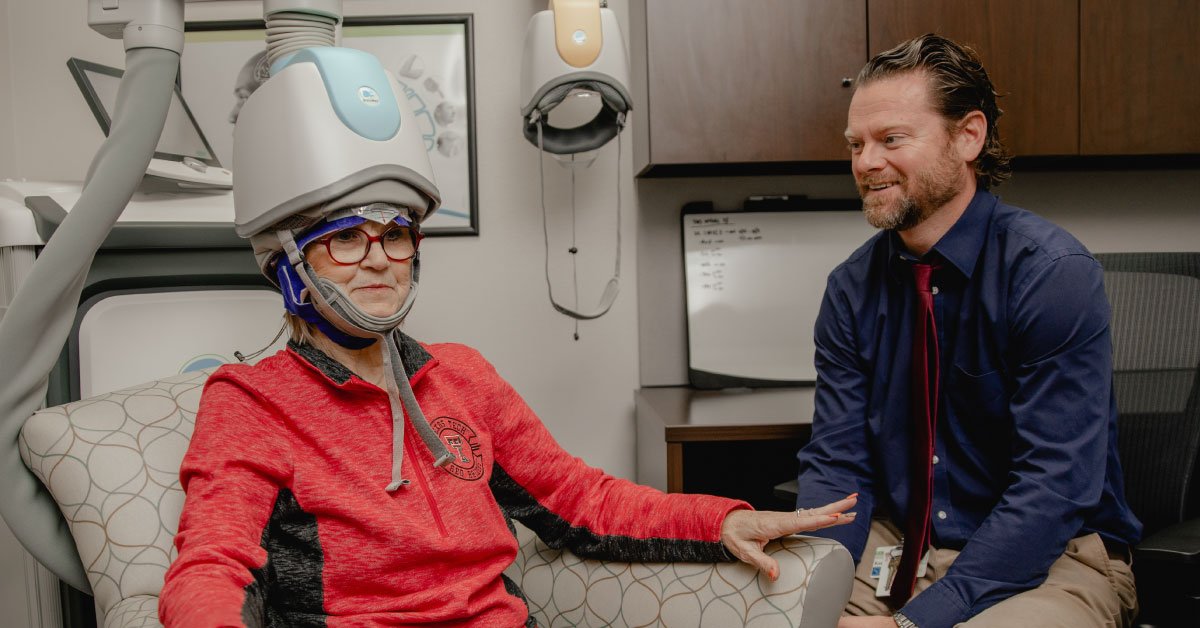
TMS Therapy
Call our TMS department: (631) 813-4950
TMS Therapy
Deep transcranial magnetic stimulation, also known as Deep TMS, is a non- pharmaceutical, non-invasive treatment for depression. It is a type of brain stimulation technique where magnetic fields are generated by a coil placed on the scalp. This current essentially activates the neuronal circuits at the stimulation site, resulting in lessened symptoms, and in some cases remission.
If you are interested in TMS Therapy - Please talk to your provider for eligibility and details.
How It Works
Deep TMS uses a special combination of coils that are capable of reaching 4cm beneath the surface of the skull, called H coils, which are manufactured by Brainsway. Different H coils are designed to target different areas in the brain. Deep TMS with the H1 coil is FDA approved for the treatment of depression in patients who have failed to improved after multiple medication trials. It is the safest option with the least side effects for patients with treatment resistant depression.
Deep TMS entails 5 daily sessions for 20 minutes, for a total of 36 sessions. Many patients schedule their sessions during a lunch break, and the patient can drive home independently after each session to resume his/her daily activities.
This technology was initially developed in 2000 at the NIH and in 2013 the Brainsway H1 coil received FDA approval for use in patients with Major Depression. In 2018, the H7 coil received FDA approval for use in patients with Obsessive-compulsive disorder.

-
What happens once I decide to seek treatment at Evolve Psychiatry?
Before you begin Deep TMS treatment, you’ll need a thorough evaluation performed by our psychiatrist who will help to determine if this procedure is right for you and for your treatment plan. Our psychiatrist will make this determination based on your history, previous medications, and the risks of the procedure in regards to your personal health. If our psychiatrist approves the treatment, the next step is determining treatment frequency, treatment duration, and treatment location.
During the actual Deep TMS procedure, you will be awake and alert. There is no need for any type of anesthesia or hospitalization due to the treatment’s noninvasive nature. You will also undergo regular follow-up visits with your psychiatrist, as well as a daily assessment of side-effects by the technician, and complete weekly follow-up measures to assess symptom progress.
-
What are the side effects of TMS?
The side effects of TMS include:
Temporary scalp tenderness
Temporary headache
Temporary jaw pain
Temporary tooth pain
Rare incidence of seizure
Most side effects are temporary and appear only during the treatment session.
Recent posts
Discover the different types of OCD beyond cleaning. Learn about checking, intrusive thoughts, and more from psychiatrists at Evolve Psychiatry.
Learn how OCD affects the brain and fuels anxiety. Discover the science behind compulsions and how treatment helps your brain heal at Evolve Psychiatry.
What OCD is, what causes it, how it shows up in real life, and the treatments that actually help. Everything is explained in simple language, so you can truly understand what living with OCD feels like.
Confused about who to see for anxiety? Learn the difference between a psychologist and a psychiatrist and find out who’s better for your anxiety treatment.
Not sure if you need a psychiatrist or psychologist? Learn when seeing a psychiatrist is the right choice and how the right help can change your mental health.
Unsure when to see a psychiatrist instead of a psychologist? Learn the key signs, differences, and how to choose the right help for your mental health.
Learn what a psychiatrist can do that a psychologist cannot - including diagnosis, medication, and medical care for complete mental health recovery.
Some days, it is hard to get out of bed. Other days, you feel anxious for no clear reason. You know something is wrong, but you are unsure what to do next. You may have asked yourself, “Do I need a psychiatrist or a psychologist?”
Confused about whether to see a psychiatrist or psychologist? Learn the key differences, when to see each, and how both support your mental wellness.
Learn who qualifies for Spravato treatment, from medical history to mental health conditions. Understand treatment resistant depression, safety checks, and what to bring for your evaluation so you can start with confidence.
Is Spravato treatment FDA approved? Yes. Approved in 2019 for treatment resistant depression and for depressive symptoms with suicidal thoughts. Learn how REMS clinic monitoring, dosing schedules, and strong evidence support safe, faster relief with esketamine.
Discover how Spravato treatment differs from antidepressants, including effectiveness, speed, and side effects. Spravato treatment, an in clinic nasal spray, works in a different way than most pills.
Understand how Spravato reshapes brain pathways. This clear guide explains the glutamate system, NMDA receptor modulation, the AMPA cascade that supports plasticity, what you may feel in session, and how therapy helps gains last.
Depression can feel heavy and lonely. Spravato treatment offers a new path for people in this situation. It works differently from most antidepressants. It is given in a clinic with close monitoring.
Learn what to expect from the TMS treatment process for depression. This step-by-step guide covers consultations, brain mapping, daily sessions, and follow-up care.
Compare TMS therapy and antidepressants for depression. Learn how each works, success rates, side effects, costs, and which treatment may be right for you.
Discover the success rates of TMS therapy for depression in 2025, what research shows about brain changes, and how this treatment compares to other options for lasting relief.
Learn how TMS therapy for depression works, the science behind magnetic brain stimulation, and how it targets underactive brain areas to improve mood safely and effectively.
Discover how TMS therapy for depression works, who it helps, success rates, side effects, and costs in 2025. Learn if this safe, non-invasive treatment is right for you.
Discover how caffeine affects the ADHD brain, why it can lead to sleepiness instead of focus, and practical tips to manage energy, mood, and mental clarity.
Feeling overwhelmed and thinking, “I have no patience for my ADHD child?” You’re not a bad parent - you’re a human facing a tough challenge. This compassionate guide helps you understand ADHD behavior, manage guilt, regain calm, and find expert support from Evolve Psychiatry.
Can ADHD develop from untreated head trauma? Learn what science says about the connection between brain injuries and ADHD symptoms. Discover signs, diagnosis tips, and how Evolve Psychiatry can help.
Struggling with relationship challenges linked to ADHD? Discover how couple therapy for ADHD can improve communication, reduce conflict, and rebuild emotional connection. Learn why early support matters, what therapy looks like, and how real change is possible. Evolve Psychiatry offers expert guidance to help couples heal and grow together.
Learn the difference between behavioral health vs mental health, how they overlap, and why this knowledge is key to finding the right care for your well-being.
Discover 30 inspiring mental health quotes that offer hope, healing, and strength through life’s toughest moments.
Discover 5 inspiring mental health movies that break stigma, spark empathy, and offer hope. Watch Movies about mental health and reflect, start meaningful conversations today.
Discover the crucial differences between Mental Health vs Emotional Health. Learn how understanding these distinctions can enhance your well-being, with practical tips from Evolve Psychiatry.
Worried about your teen’s mood? This comprehensive guide for parents explores psychology and depression in teens - understand teenage depression, its signs, causes, and how to help your child.
Explore clinical updates on ketamine-assisted psychotherapy from APA 2025. Learn how KAP is reshaping treatment for depression and trauma-related disorders.
Discover how a child psychologist supports emotional and behavioral growth. Learn what to expect, when to seek help, and how therapy can benefit your child.






























